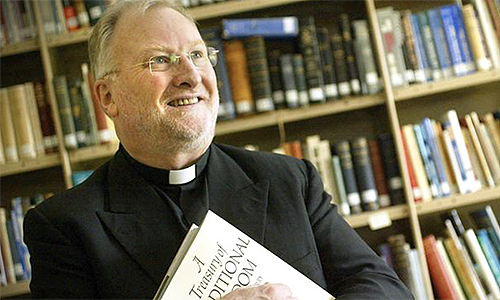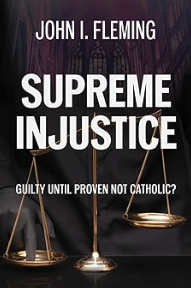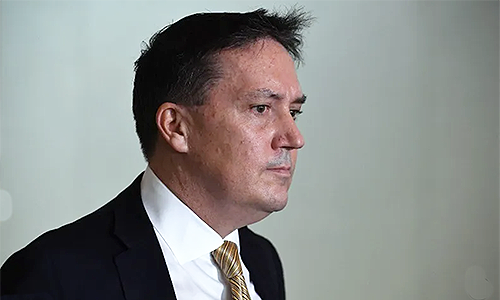
by PAUL COLLITS – AUSTRALIAN men accused of sexual crimes of one sort or another have been much in the news of late.
Everyone on earth, including, perhaps, in the south of France, has now heard of Brittany Higgins, the latest poster-girl of sexual assault victims.
- The presumption of innocence is at risk, which is at the very heart of our judicial system.
- Defamation cases are supposed to be about righting wrongs.
- These days, courts are more interested in “we believe you” ideology – even if the clamed “victim” has no case.

But there has been a long line of other well-known men similarly accused. Their cases will be familiar.
Christian Porter, George Pell, Craig McLachlan, John Jarratt, Geoffrey Rush, come to mind.
TRAVESTY
Few have actually been accused in a criminal case. Only Pell was convicted, and the travesty of justice that saw him condemned was crushed by the High Court in 2020.
They have all been accused in the mean and nasty court of public opinion, where media organisations and aggrieved complainants have set out to crush lives and reputations.
All on the back of a decades old moral panic and an emergent ideology that has come to be known as “#MeToo”. An ideology that has gripped and thoroughly captured police forces, judiciaries, the media and quivering politicians.
The accused (but unarrested and unconvicted) man has a choice to make. Do I sue for defamation? Do I try to recapture my life and reputation in the face of claims that, for whatever reasons, have not been tested in a criminal court?
The choice has been described as a “throw of the dice”. Or, in the words of Justice Michael Lee, “going back for your hat”.
Which brings us to the case of Fr John Fleming.
John Fleming is a Catholic (formerly Anglican) priest accused, and presumed guilty, of sex crimes in the court of South Australian public opinion. In this case by the Murdoch rag, The Advertiser.
One of the accusations made against him involved alleged sexual relations with a minor. He has never been convicted in a court of criminal law, nor has he even been asked to front one.
DECENT
With Fleming’s career as an outstanding scholar and respected academic, and his reputation as a fundamentally decent man, trashed on the say-so of a couple of complainants, he sought redemption through the defamation process. He lost.
Then he appealed, and he lost again. The High Court refused to hear his appeal to the ultimate legal authority in Australia.
So, he has written a book about his case.
The legal events took place around a decade ago. The events alleged by the main complainant were said to have occurred around half a century ago.
Fleming’s book is titled Supreme Injustice: Guilty Until Proven Catholic (2024).
The book is timely, given all of the related legal goings-on referred to above, and the troubling questions to which these cases give rise.
It is a detailed accounting of his court case, told with precision, honesty and righteous, aggrieved anger.
It is an invaluable resource for those of us who feel queasy about the direction of justice in Australia and about the core principles of law that we seem to have abandoned.
SALVAGE
Fleming’s case, like those of the aforementioned who have sought defamation compensation in order to salvage their reputations, quickly turned into a surrogate criminal trial with the defamation plaintiff quickly becoming the defendant.
What is at stake is the presumption of innocence, at the very heart of our judicial system.
There is one thing, an assumed legal article of faith, that, in theory, protects defamation plaintiffs from becoming themselves victims of witch-hunts in the civil courtroom. It is a legal principle called “Briginshaw”.
Briginshaw means that, when there are serious criminal allegations made, there should be a higher standard of proof applied. At least that is the theory.
As Fleming explains in his book, it isn’t always the practice. It wasn’t in his own case, and he has been paying a high price ever since.
The “protection” provided by Briginshaw is all about standard of proof. Fleming was falsely accused of engaging in sexual activity with a minor. Accusations, especially these days, don’t get much darker.
It is Fleming’s contention that the judge in his case did not apply this principle.
There is one institution, in particular, that has failed John Fleming and the system of justice. The failure of the High Court to act in this matter is a disgrace.
And this ongoing sleeper issue isn’t just about the innocence of one man. It isn’t minor and it isn’t a one-off problem.
The inconsistent application of Briginshaw is creating confusion across the whole defamation system. Confusion and injustice.
The systemic persistence is allowing defendants in civil cases to get away with lower standards of proof in the damning allegations they make at trial, and encouraging them to turn civil cases where they are in the dock into quasi-criminal cases against often doomed plaintiffs.
The book isn’t just about the failure of the court to take proper account of the established Briginshaw principle. While it is Fleming’s public statement of self-defence, it is also a savage indictment of our legal system as a whole.
In it, he takes apart the performance of the judge. It was a judge-only trial.
And he castigates the Supreme Court of South Australia for allowing the verdict to stand. It is a forensic examination of The Advertiser’s defence, the Judge’s reasoning (or lack thereof) and the main complainant’s veracity and narrative, which wobbled over time.
ALIBIS
It shows that the accused had numerous alibis for the events alleged. It also shows that the accused had legal right (Briginshaw) on his side.
For John Fleming, his religion and his vocation as a priest triggered people who have been in thrall to a moral panic and an ideology.
Our system as applied in Fleming’s awful defamation case clearly didn’t consider the damage done to him through gutter journalism.
Aren’t defamation cases supposed to be about righting wrongs? The court was more interested in “we believe you” ideology.
Thank God for Fleming’s book and for his family in standing in support of his attempt to achieve a measure of public justice in the face of the unrelenting attacks on him.
Reading the book will be a sobering, yet highly worthwhile experience for the general reader.
It will be compelling for anyone with a legal background and with an interest in restoring a law enforcement and judicial system that is under heavy ideological bombardment.PC













Queensland’s public service (which includes police, judges, magistrates, councils and those who preside in tribunals) have been very much corrupted by this labor government, and in particular, by the office of the state attorney general. Justice does not exist in this state (nor the rule of law). How does labor do it? By appealing to self interest (theirs and the other parties). Those police, judges, magistrates, councillors and council CEOs, etc who toe the party line get promoted and appointed to plumb posts. Those who don’t are likely to be posted to Whop Whop, not promoted, and not have their contacts renewed (if they are on contract). Why do you think so many univeristy staff are on contracts? Answer: to ensure a high “pass” rate and hence university revenue (especially from full fee paying, overseas students). Our universities have been trashed, as have so many government institutions.